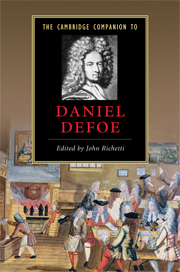Book contents
- Frontmatter
- Introduction
- 1 Defoe: the man in the works
- 2 Defoe’s political and religious journalism
- 3 Defoe, commerce, and empire
- 4 Defoe and criminal fiction
- 5 Money and character in Defoe’s fiction
- 6 Defoe’s Tour and the identity of Britain
- 7 Defoe as narrative innovator
- 8 Gender and fiction in Moll Flanders and Roxana
- 9 Defoe and London
- 10 Robinson Crusoe: varieties of fictional experience
- 11 Defoe: satirist and moralist
- 12 Defoe and poetic tradition
- Further Reading
- Index
12 - Defoe and poetic tradition
Published online by Cambridge University Press: 28 March 2009
- Frontmatter
- Introduction
- 1 Defoe: the man in the works
- 2 Defoe’s political and religious journalism
- 3 Defoe, commerce, and empire
- 4 Defoe and criminal fiction
- 5 Money and character in Defoe’s fiction
- 6 Defoe’s Tour and the identity of Britain
- 7 Defoe as narrative innovator
- 8 Gender and fiction in Moll Flanders and Roxana
- 9 Defoe and London
- 10 Robinson Crusoe: varieties of fictional experience
- 11 Defoe: satirist and moralist
- 12 Defoe and poetic tradition
- Further Reading
- Index
Summary
To modern eyes, Daniel Defoe does not look much like a poet. He seems temperamentally wrong for the role: practical and matter-of-fact in his outlook, prosaic in his language, always concerned with getting and spending, very seldom meditative or even deeply thoughtful about his own feelings. His writing is almost always rambling and loose rather than concise, analytical and argumentative rather than sensitive or reflective; he piles up facts, details, and rationales rather than depending on nuance, allusion, or subjective association. When he does write poetry (and there is a period in his life when he wrote verse voluminously), he demonstrates an ability to reason articulately and rhyme readily but seldom creates smooth, satisfying harmonic lines or verse paragraphs with pleasures for the ear or eye: his lines vary between utter metric predictability and a rough and rugged uncertainty of rhythm that seems to result from impatience or haste. And so almost no one except his biographers bothers to read his poetry today - in spite of the fact that he was arguably the most-read poet in England for some years in his middle age, wrote more than a dozen long poems totaling some 20,000 lines, and for much of his lifetime was far better known as a poet than a novelist. Even though he is now one of the three or four most written-about writers of the eighteenth century (and quite possibly the most-often read), there is very little critical analysis of, or even commentary on, his poetry. And the poems themselves are hard to find; until the late twentieth century, almost all of them had been out of print for more than 250 years, and even now most are available in print only in scarce and expensive editions that even many research libraries do not own. Yet for much of his early writing career Defoe seems to have thought of himself mainly as a poet and to have imagined that any literary posterity he might have would depend on his poetry.
- Type
- Chapter
- Information
- The Cambridge Companion to Daniel Defoe , pp. 216 - 236Publisher: Cambridge University PressPrint publication year: 2009



